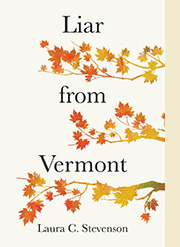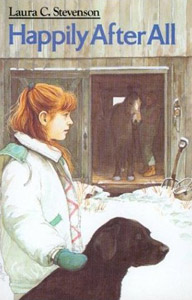A New Series: One Minute Reviews of
Books by Vermont Authors
Laura's column "One Minute Reviews" has appeared bi-weekly in Wilmington, Vermont's Deerfield Valley News since 2015. In April 2018, she found that no Vermont periodical consistently reviews all commercially published fiction and non-fiction by Vermont authors, so she started a series to fill that void. Published reviews from that series and some earlier reviews of local authors are listed with links to a scan of the printed copy. Reviews still in queue are listed without links until they appear in print.
The books reviewed in this series are available through Wilmington's Pettee Memorial Library, the Whitingham Free Public Library, and locally owned Bartleby's Books in Wilmington.
Deerfield Valley News, 3/21/2024
This Old House
Daniel Mason, North Woods: a Novel. Random House, 2023
North Woods chronicles the three-hundred-year history of a fictitious house, fields and forest near the Vermont border of Western Massachusetts. Over the course of that history, greatly differing residents find the place a refuge, a source of inspiration, an unwanted inheritance, an unsuccessful investment, a crime scene, and a permanent spiritual home. Animals, insects, fungi, trees, and streams are as important to Mason as the landscape’s human inhabitants, making the novel an extended reflection—often humorous, sometimes tragic, always compassionate—on the intermingling of human life and ecological change.
The plot is divided like an old almanac into twelve sections; its omniscient narrator looks over the shoulders of characters whose voices reflect literary styles associated with its historical periods. A romantic escape narrative portrays the flight of two lovers from a Puritan colony and the cabin they build in the forest. A “Captured by Indians” letter recounts a widow’s murder of settlers who plan to destroy a Native American village. A British soldier-become-orchardist leaves a letter of botanical instructions for his mismatched identical twin daughters as he marches off to fight against the Revolution. A ballad describes a catamount’s slaughter of the Merino sheep left untended by the daughters’ demise. A slave catcher disturbs long-dry sheep skeletons as he searches the deserted house for his quarry. A ballad describing an owl’s winter murder of a squirrel explains that sprouting seeds of the victim’s wasted hoard begins the orchard’s reforestation. Impassioned letters from a Romantic painter to his lover describe his renovation of the house. A confession that a nurse whispers to the forest’s soil reveals a betrayal. A false Medium’s séance accidentally raises “real” ghosts at the house, now filled with stuffed trophies of the Gilded Age hunter. A naturalist tells “a tale of two winds” that bring spores of the Chestnut blight to the forest. The case notes of a lobotomist diagnose a troubled boy as schizophrenic. A riotous mingling of Playboy sexual enthusiasm and scientific analysis describes the mating frenzies of Dutch Elm disease beetles. A breathless story in True Crime describes the gory end of an escaped prisoner’s attempted attack on a charitable prisoner correspondent. Labeled reels of old home movies suggest that the troubled boy’s schizophrenia might in fact have been a vivid consciousness of the house’s former residents. A lecture declaimed to a mirror by an historian banned by the Historical Society of Western Massachusetts reveals the accuracy of his research on the house—and leads to a fatal attempt exhume the one corpse True Crime did not mention. And finally, an accident and the the spiritual research of a young naturalist meditates upon a larger ecological “tale of change.”
Amidst this cacophony of voices, the novel increasingly suggests that the fabric separating the corporeal and the spiritual is so thin that people who identify with the natural world can pass through it. A few of these simply wish to preserve the landscape of their pasts: “I have come to the opinion, generally,” writes the martial orchardist, “that he who is good to the land will be protected, while those who trespass upon her will be met with most violent return.” His observation is prophetic, but gentler souls who appreciate the ephemeral nature of field and forest also achieve a spiritual immortality that Daniel Mason, following the leads of Henry James and Edith Wharton, has the tact not to investigate too deeply. His splendid book meditates on New England’s history while acknowledging, with a small ironic smile, the presence of the spirits who linger around old houses and landscapes that once sheltered the inhabitants of Western Massachusetts and Vermont.


